Author Archives: Yona Zeldis McDonough
March 31, 2020 by Yona Zeldis McDonough
A Memoirist on Making Tragedy Meaningful
- No Comments
March 28, 2020 by Yona Zeldis McDonough
The Light After the War: Jews in Caracas
Two best friends jump off a train heading for Auschwitz, leaving their mothers still on board. They survive the rest of the war in hiding, and when peace is finally declared, make their way to Naples, then Ellis Island and finally Caracas, trying to rebuild their shattered lives. This actually happened to Anita Abriel’s mother, and she used it as the basis for her newest novel, The Light After the War (Atria Books, $27). She talks to Fiction Editor Yona Zeldis McDonough about how and why she transformed fact into fiction.
- No Comments
March 24, 2020 by Yona Zeldis McDonough
Real Life Mysteries: A Lost Voice and Communication With the Dead
Everyone loves a great mystery on the page, but what about in real life? Victoria Zackheim decided to ask a group of writers exactly that question and she collects their answers in the new volume, Private Investigations: Mystery Writers on the Secrets, Wonders and Riddles in Their Lives (Seal Press). Caroline Leavitt’s mystery began with her losing her voice, and the endless medical quest she embarked on to find out why. Hallie Ephron was prompted to write about a friend’s belief that she could communicate with her dead brother. Both of these writers talk to Fiction Editor Yona Zeldis McDonough about how their essays were informed by their experience as Jewish women.
- No Comments
March 16, 2020 by Yona Zeldis McDonough
The Fraught and Frayed Bonds of Sisterhood
The fraught, frayed bonds of sisterhood is a subject beautifully explored by Lynda Cohen Loigman in The Wartime Sisters (St. Martin’s Press) a WWII-era novel that probes the connection between Millie—beautiful, impractical—and Ruth, pragmatic yet desperate to protect the life she’s carved out for herself.
Loigman talks to Fiction Editor Yona Zeldis McDonough about how she found her way to their story and where it took her.
Yona Zeldis McDonough: What attracted you to the subject of the Springfield Armory and how did you go about doing your research?
- No Comments
February 11, 2020 by Yona Zeldis McDonough
One Book, Three Protagonists…and Three Authors!
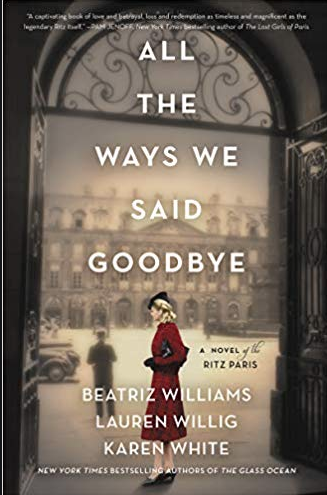
A book with three main protagonists and three different time periods is not so uncommon. But when that book is written by three different authors collaborating on a single whole, that’s pretty unusual. And that’s the case with the newly released All the Ways We Said Goodbye (William Morrow) written by the team of Beatriz Williams, Lauren Willig and Karen White. It feels so feminist to write a novel collaboratively, we had to know more. Willig chatted with Fiction Editor Yona Zeldis McDonough about how the story arcs of Aurelie, Daisy and Babs all converge at the Hotel Ritz in Paris, and about the benefits of three authors, one Unibrain.
Yona Zeldis McDonough: Where did the co-writing idea come from and how does it work?
Lauren Willig: Three authors walked into a bar…. But, really! It was the summer of 2012, and the three of us were indulging in a little liquid comfort at a writers’ conference. We’d all just come back from book tour and were moaning about how lonely it was to tour on our own and what fun it would be if we could just be together like this always, when one of us came up with a brilliant idea: all we had to do was write a book together! And then our publisher would pay for our girls’ trip and our bar bill. Simple as that.
- No Comments
January 30, 2020 by Yona Zeldis McDonough
Love and the Law in “That’s Not a Thing.”
Meredith Altman has a serious choice to make—does she return to her first love, and confront the heartbreak she caused him? Or does she keep a safe distance in order to protect the new relationship she’s built? These are the questions that animate Jacqueline Friedland’s That’s Not a Thing (Spark Press) and the author talks to Fiction Editor Yona Zeldis McDonough about the ways in which Meredith’s journey mirrors—and departs from—her own.
YZM: The theme of guilt is threaded through the novel—do you feel it’s a particularly Jewish kind of guilt?
- No Comments
January 11, 2020 by Yona Zeldis McDonough
Otherness and Family Secrets—Stories from the Borscht Belt
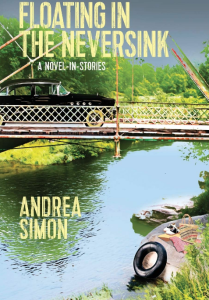 Floating in the Neversink (Black Rose Writing), a wistful novel-in-stories, evokes a particular moment in American Jewish culture–the Catskills and New York in the 1950s and 60s. Author Andrea Simon talks to Fiction Editor Yona Zeldis McDonough about her journey back to the past.
Floating in the Neversink (Black Rose Writing), a wistful novel-in-stories, evokes a particular moment in American Jewish culture–the Catskills and New York in the 1950s and 60s. Author Andrea Simon talks to Fiction Editor Yona Zeldis McDonough about her journey back to the past.
YZM: This is a coming-of-age novel in which Mandy’s family is front and center.
AS: The 1950s and 1960s were a unique time in New York for many Jewish families, before they dispersed to faraway areas for settling and travel. In many cases, families provided the pivotal gathering framework for socialization. This was particularly true for New York’s Catskill Mountains, also known as the Borscht Belt.
- No Comments
January 9, 2020 by Yona Zeldis McDonough
After She Lost Her Father, She Found Him
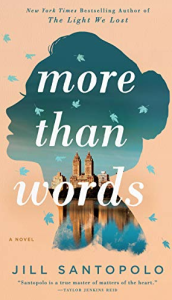 In More Than Words (Putnam), Jill Santopolo’s newest novel, Nina Gregory faces a double loss—the death of her beloved father and the shattering of her illusions when she discovers that he wasn’t at all the man she thought he was. Santopolo talks with Fiction Editor Yona Zeldis McDonough about what she and her protagonist share—and what they don’t.
In More Than Words (Putnam), Jill Santopolo’s newest novel, Nina Gregory faces a double loss—the death of her beloved father and the shattering of her illusions when she discovers that he wasn’t at all the man she thought he was. Santopolo talks with Fiction Editor Yona Zeldis McDonough about what she and her protagonist share—and what they don’t.
YZM: Your mother is Jewish and your father was Christian; how did that shape your characters?
JS: In my novel, More Than Words, two of the main characters have parents from different places with differing traditions. Nina’s mother’s family is from Greece and her father’s family is from Wales, and Rafael’s mother’s family is from Ireland and his father’s family is from Cuba. Nina and Rafael connect, at one point in the book, when they talk about what it means to feel that duality of identity. That experience, of dual identity, is something that I felt growing up–and still feel today–and the conversation they have was inspired by one that I had with my husband, whose background is the same as mine but reversed. Even though I’ve written many other books, this is the first time that I wrote about that experience, and even though Nina and Rafael’s dual identities don’t match my own, the essence of what it feels like to have a family that’s not simply one thing or another is the same.
- No Comments
January 8, 2020 by Yona Zeldis McDonough
The Power of Humor for Smashing the Patriarchy
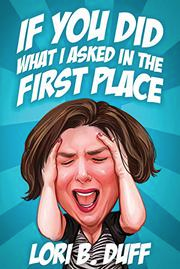 Most attorneys don’t moonlight as a humorists, so Lori B. Duff’s new collection of essays, If You Did What I Asked in the First Place (Deeds Publishing), may just be a first of its kind. Duff talks to Fiction Editor Yona Zeldis McDonough about her unusual professional pairing.
Most attorneys don’t moonlight as a humorists, so Lori B. Duff’s new collection of essays, If You Did What I Asked in the First Place (Deeds Publishing), may just be a first of its kind. Duff talks to Fiction Editor Yona Zeldis McDonough about her unusual professional pairing.
YZM: How do the jobs of lawyer and comic coexist in your life?
LBD: I feel sorry for lawyers without a sense of humor. I feel like those two things are the Yin and Yang of my life. They balance each other out. The law can be so harsh. No one thinks, “I’m having the best day of my life. I think I’m going to go see my lawyer.” People come to talk to me professionally when they are at their lowest: when someone has died, when their marriages are breaking apart, or when they are in financial trouble. When you focus on those things for 40 or more hours a day, you start thinking the entire world is tragedy. It’s important to balance that by thinking about the opposite of tragedy, which is comedy. When you add to that the maxim that comedy is tragedy plus time, they are natural partners. (more…)
- No Comments
December 26, 2019 by Yona Zeldis McDonough
A Jewish Girl’s Summer Among New England WASPs
It’s 1987 and Eve Rosen, a young aspiring editor, abruptly leaves her lackluster job in New York City and decamps to Cape Cod. Once there she becomes the assistant to a well-regarded older male writer and is ushered into the kind of heady literary life she’s only been able to dream about. Author Karen Dukess talks to Fiction Editor Yona Zeldis McDonough about The Last Book Party (Henry Holt), her witty and tender debut novel.
YZM: Does Eve feel intimidated by the largely non-Jewish crowd she finds herself in with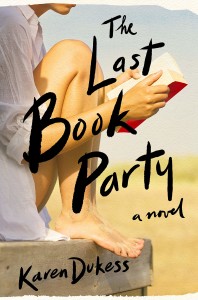 that summer?
that summer?
KD: Eve is definitely intimidated by this crowd, but the aspect of their difference from her own background that most unsettles her – and also attracts her – is not that they are not Jewish, but that they are writers and artists. Eve believes that if she had been born into a literary world instead of the conventional, upper-middle class, professional world of her family, her path to becoming a writer would be smoother. She’s comfortable with people like her parents who read The New Yorker (or just subscribe and let it pile up) but she is intimidated by people who write for The New Yorker. Everything about this crowd is “other” to Eve – they are accomplished, sophisticated and worldly in a way that Eve yearns to be. That they are mostly WASPy is just one more factor of difference.
- No Comments
 Please wait...
Please wait...